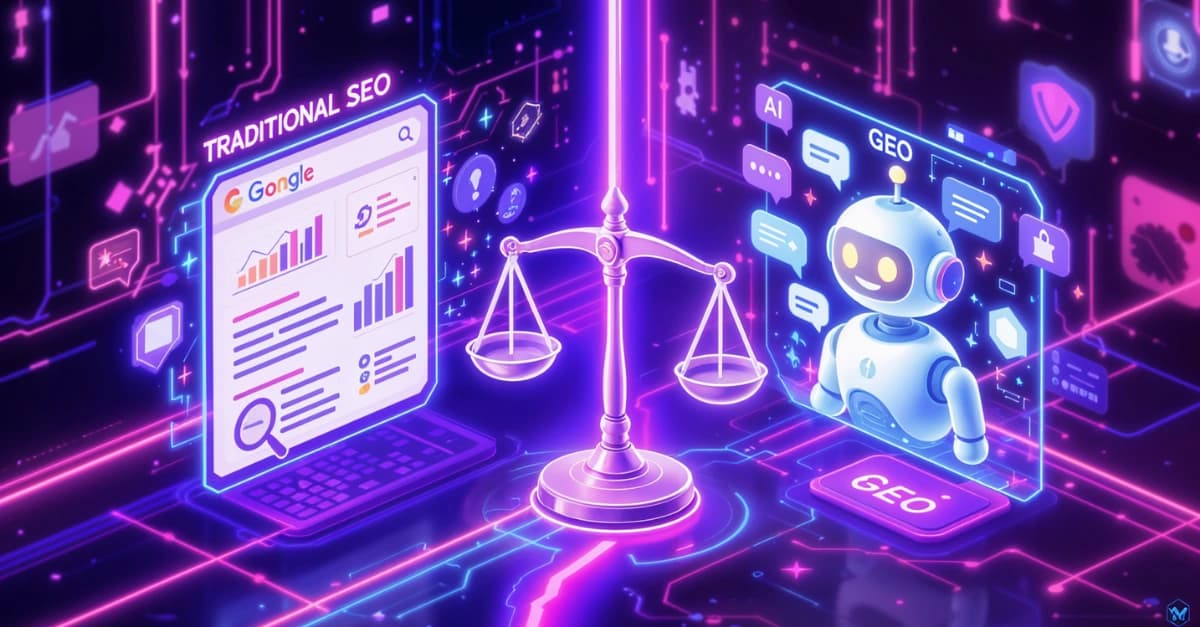Geo Vs Traditional Seo: The Future Of Ranking In Ai Search Engines

For years, Search Engine Optimization (SEO) has been the backbone of online visibility. Ranking on Google meant more clicks, more traffic, and more sales. But in 2025, the rules are changing fast.
With the rise of AI-powered search engines like Google’s Search Generative Experience (SGE), Bing AI, and ChatGPT search, businesses now need to think beyond traditional SEO. That’s where Generative Engine Optimization (GEO) comes in.
If you’re wondering whether to stick with SEO or pivot to GEO, the truth is simple: you need both. But how they work and the results they deliver are very different.
What Is Traditional SEO?
Traditional SEO is the process of optimizing your website so it ranks higher on search engines like Google. This includes keyword optimization, backlinks, mobile-friendliness, page speed, and content relevance.
The goal is simple: to appear in the top 10 search results when someone types in a query.
Example: A customer searches “best café in Auckland.” Traditional SEO helps your café’s website show up on page one.
What Is Generative Engine Optimization (GEO)?
GEO focuses on optimizing your content to appear in AI-generated answers. Instead of displaying long lists of links, AI search engines generate direct responses, pulling information from trusted sources.
The difference? Instead of being “one of many,” your business has the chance to be the answer.
Example: Someone asks ChatGPT, “Where’s the best café near me with vegan options?” If your café has conversational content and GEO-friendly signals, the AI might recommend you directly.
GEO vs SEO: The Key Differences
Here’s where the two strategies diverge:
SEO optimizes for Google’s algorithm, while GEO optimizes for AI-driven engines.
SEO relies on keywords and backlinks, while GEO relies on conversational, context-rich content.
SEO competes for rankings in search results, while GEO competes to be featured in AI-generated answers.
SEO drives traffic through click-through rates, while GEO builds trust by being recommended as the solution.
SEO results can take time, while GEO offers early adopters faster visibility in AI-powered platforms.
Why GEO Is the Future
AI search adoption is exploding – Millions of users now turn to AI assistants instead of Google.
Trust is concentrated – Instead of ten results, AI highlights just one to three trusted businesses.
Voice and chat search are growing – Users want conversational answers, not endless scrolling.
First movers win – Just like early SEO adopters dominated Google, early GEO adopters will dominate AI search.
Should Small Businesses Abandon SEO?
Not at all. Traditional SEO is still essential. Google and other search engines aren’t going anywhere, but they’re evolving.
The real strategy for 2025 is SEO and GEO working together.
SEO gets you discovered on search results.
GEO gets you recommended by AI assistants.
Think of it like this: SEO puts you on the map. GEO makes you the destination.
Final Thoughts
The shift from SEO to GEO is one of the biggest changes in digital marketing in over a decade. Small businesses that adapt now will be the ones AI assistants recommend tomorrow.
If you want your business to be visible in both traditional search and AI-powered search engines, it’s time to combine SEO with GEO.
📧 info@iconglobaldigital.com
📞 +61 411 681 788
🌐 www.iconglobaldigital.com
📅 Book your free GEO strategy session today:
👉 https://www.iconglobaldigital.com/schedule-meet
Tell us about your project
Help us understand your needs so we can provide the best solution



